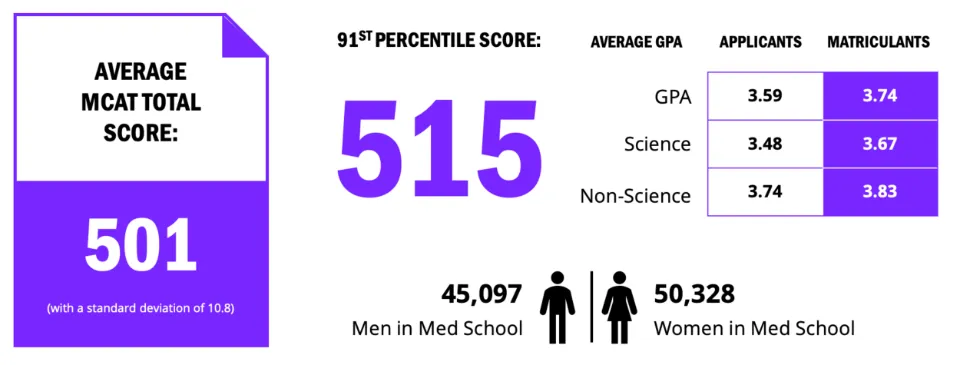
Is 515 a Good MCAT Score? What is a Good MCAT Score?
Are you interested in the MCAT results and how well you did? Our comprehensive guide is below and covers everything score-related.
A “good” individual’s MCAT score can vary, but in the end, a good score is one that helps you get into the medical school of your choice. Is 515 a good MCAT score? Yes. It differs depending on a number of variables, including the schools you’re applying to, your GPA, and the standard of the rest of your application materials.
Use the information in the following to learn more about MCAT scores, evaluate your own performance, and decide whether or not you have the necessary score to be admitted to the college of your choice.
Is 515 a Good MCAT Score?
Yes. You performed in the 94% percentile if you received an MCAT score of 515. An MCAT score of at least 511 and no section score lower than 127 is considered good. However, a “good” Because applicants to medical school are assessed holistically, there will be variation in MCAT scores from applicant to applicant.
You will be a much more competitive applicant if your MCAT score is at least 515, which will put you in the 90th percentile of test-takers overall. The 94th percentile score of 517 should almost guarantee admission.
Read More:
- How to Increase Your MCAT Score by 20 Points?
- How to Send MCAT Scores to AACOMAS?
- When To Take The MCAT?
However, keep in mind that 16% of applicants with scores over 517 were turned down for admission to medical school in 2021–2022.

Where Should I Apply to Medical School Based on My MCAT Score?
These are very general recommendations for where to apply to medical school based on your MCAT scores and assuming that your GPA is 3.5 or higher. Depending on your state of residence, ethnicity, level of disadvantage, and other variables, these suggestions may change.
- Apply to the allopathic and osteopathic medical schools in your state if your MCAT score is 505 or lower.
- Apply to medical schools in your state with an MCAT score between 506 and 509. Apply to a handful of additional allopathic medical schools and 15 – 20 osteopathic medical schools.
- Apply to 25–30 carefully chosen allopathic medical schools and your state’s medical schools if your MCAT score is between 510 and 514. Consider applying to a few prestigious osteopathic medical schools, depending on other aspects of your profile.
- MCAT of 514 or higher: Apply to your state medical schools and 25 allopathic medical schools. Your school list should be more selective the higher your MCAT score.
Average MCAT Scores Vary by School
Various MCAT score ranges are accepted by various medical schools. Although the average matriculant score is much higher, most schools only accept scores up to 500.
While some very competitive schools like to see scores around 515 or above, less competitive schools are more likely to accept students with scores below 510. Even if you score in the top percentiles, admission to the school of your choice is not guaranteed.
For test takers to use while preparing for the MCAT and researching various medical schools, the Medical School Admission Requirements™ (MSAR) is a great resource. The tool is priceless, but access for a year costs $28. The average MCAT scores that each medical school accepts are displayed in the database.

This can help you choose a target score, but it can also point you in the direction of schools you might not have previously thought about. To broaden your search and find more possible schools that are more likely to accept you, look into colleges that accept students in your target range.
Of course, when you visit the website for each med school you’re interested in, you will probably be able to find statistics on the MCAT scores they typically accept. Simply put, MSAR is a quicker and less time-consuming way to sort through important data on a lot of medical schools.
Your objective should be to score on par with or higher than the average student at your prospective school when you look at the MCAT average score for students there. This could be 509 for some institutions, and it’s probably going to be 515-520+ for the most selective medical schools.
What to Do If You Meet Your Target MCAT Score?
You should have a good idea of what MCAT score to aim for after taking your GPA, the average scores of the schools you’ll apply to, and the strength of your application into account. What occurs once you begin attaining that score on practice exams?
Think about the practice exams you are taking first. If you’re hitting your target score on practice exams, you’ll probably hit your target score on the actual MCAT as well because the majority of them are known to be harder than the actual MCAT.
The exception is the AAMC’s practice tests. You shouldn’t anticipate getting a significantly higher score on the real MCAT because those are so much closer to it.
Don’t stop once you begin to reach your desired score. Aim for a score that is acceptable to you, but if you start to outscore that number on practice tests, don’t stop preparing. The only time you should stop studying for the MCAT is when it is a day or two away.
If you finish studying too soon, you’ll start forgetting what you’ve learned. You will be well-prepared for test day if you keep reviewing and studying.

Low MCAT Scores Can Be Buffered by Strong Applications
One component of your application is the MCAT. Your application also consists of your :
- GPA
- MCAT score
- Letters of recommendation
- Personal statements and essays
- Transcripts
- Experience
- Extracurriculars
- Achievements
To be a well-rounded applicant with a strong application, you’ll want to stand out in every area. It’s time to strengthen your application if your MCAT score is lower than you’d like.
Some students perform better on exams than others, and if this applies to you, a strong application can make all the difference. In general, if you have a very strong application, you might be able to get away with a lower MCAT score and vice versa.
Though the MCAT and GPA are the parts of your application that are given the most weight, be aware of this. If your MCAT score is too low, the admissions committee will reject your application before even looking at the other parts, even if the rest of your application is very strong.

MCAT Score Vs GPA
The MCAT score and your GPA are typically the first things an admissions committee will look at. It’s very likely they won’t look at any other part of your application if these numbers fall short of their expectations.
Generally speaking, a strong MCAT score can compensate for a weak GPA, and vice versa. For instance, students with a low GPA and a low MCAT score were very unlikely to be accepted to medical school, per AAMC data from 2018 to 2021. However, their chances only slightly improve when they have a low GPA and a high MCAT score or a high GPA and a low MCAT score.
In extreme cases, 1.3% of applicants with an MCAT score below 486 but a GPA of at least 3.97 were accepted. 18.8% of applicants with a GPA between 2.60 and 2.79 and an MCAT score above 517 were accepted.
Unsurprisingly, the greatest acceptance rates are in the students who had both a high GPA and a high MCAT score. The acceptance rate was 86.6 percent for students with a GPA of at least 3.97 and an MCAT score of at least 517.
Your target MCAT score may be attainable if your GPA is very high.
The Bottom Line: Increase Your MCAT Score
Most medical schools require an MCAT score of at least 510 and a maximum score per section of 127 in order to consider applicants for admission. Even if your MCAT score is only average, you might still be admitted if your application is exceptional.
You might still be admitted if your MCAT score is exceptional but your application is only average. Your chances are much higher if you submit an outstanding application and earn an outstanding MCAT score.
The MCAT score is only one component of the overall picture when applying to MD programs, even though medical schools frequently screen applications based on GPA and MCAT scores. Investing at least three months in preparation is crucial before taking the MCAT. Good luck!
FAQs
How Hard is a 515 MCAT?
Attaining a score of 515 on the MCAT means you performed in the 94% percentile. For the section scores, an even distribution is preferred.
Is a 510 MCAT Good Enough for MD?
Without taking other factors into account, the ideal MCAT score is 510 or above with a score of at least 127-128 in each section. The average MCAT score for all applicants to and matriculants at medical schools is made public by the Association of American Medical Colleges.
Should I Retake the MCAT If I Got a 515?
Even if the average MCAT score for matriculants at these top-tier schools is 520 or 521, scoring 518 or higher will help you be competitive if you have a strong GPA and extracurricular resume. With these results, you won’t need to retake the MCAT because colleges will view you as an academic powerhouse.


